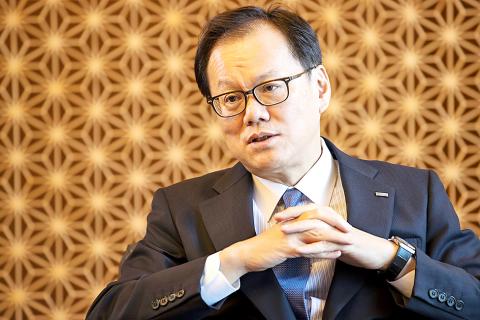Mizuho Financial Group Inc will pursue a digital route if it decides to follow its Japanese competitors into retail banking in Asia’s fast-growing emerging markets, chief executive officer Tatsufumi Sakai said.
Japan’s third-largest banking group is more likely to either buy an online lender or build one from scratch itself, rather than acquire banks with physical branches, Sakai said in an interview.
“We don’t intend to enter legacy consumer business at this point,” he said. “We’re more interested in a digital business model.”

Photo: Bloomberg
Japan’s biggest banks have made Asia their focus as persistently low interest rates and a sluggish economy hurt prospects at home.
Mizuho’s approach would mark a sharp contrast with Mitsubishi UFJ Financial Group Inc and Sumitomo Mitsui Financial Group Inc, which have spent billions of dollars acquiring traditional commercial lenders in Southeast Asia in recent years.
While Mizuho does not have any specific plans to get into retail banking in emerging Asia right now, the region has huge growth potential and a young population that is embracing digital technology for banking, Sakai said.
“The need for financial services will no doubt increase,” he said.
With the weakest capital ratio among the three Japanese banks, Mizuho has less room to make acquisitions of the scale that its rivals have achieved. At home, it is reducing its retail branch network and bolstering digital channels, according to a five-year business plan released last month.
Sakai, 59, also spoke of ambitions to expand transaction banking for corporate clients in Asia.
Handling more money transfers and cash flows for companies would allow the bank to boost its overseas deposits, providing a relatively cheap source of foreign-currency funding.
Mizuho and its rivals have been aggressively expanding overseas lending, which generates bigger margins than domestic loans.
“It’s important to secure as much as client deposit money as a stable funding source” to continue expanding lending abroad, Sakai said.
While there has been ample liquidity in the past three years, “we expect the funding environment will become tighter,” he said.
Sakai ruled out the idea of acquiring a US bank to expand Mizuho’s dollar deposits, given the costs of buying and integrating a local lender, along with regulatory issues.

TAKING STOCK: A Taiwanese cookware firm in Vietnam urged customers to assess inventory or place orders early so shipments can reach the US while tariffs are paused Taiwanese businesses in Vietnam are exploring alternatives after the White House imposed a 46 percent import duty on Vietnamese goods, following US President Donald Trump’s announcement of “reciprocal” tariffs on the US’ trading partners. Lo Shih-liang (羅世良), chairman of Brico Industry Co (裕茂工業), a Taiwanese company that manufactures cast iron cookware and stove components in Vietnam, said that more than 40 percent of his business was tied to the US market, describing the constant US policy shifts as an emotional roller coaster. “I work during the day and stay up all night watching the news. I’ve been following US news until 3am

UNCERTAINTY: Innolux activated a stringent supply chain management mechanism, as it did during the COVID-19 pandemic, to ensure optimal inventory levels for customers Flat-panel display makers AUO Corp (友達) and Innolux Corp (群創) yesterday said that about 12 to 20 percent of their display business is at risk of potential US tariffs and that they would relocate production or shipment destinations to mitigate the levies’ effects. US tariffs would have a direct impact of US$200 million on AUO’s revenue, company chairman Paul Peng (彭雙浪) told reporters on the sidelines of the Touch Taiwan trade show in Taipei yesterday. That would make up about 12 percent of the company’s overall revenue. To cope with the tariff uncertainty, AUO plans to allocate its production to manufacturing facilities in

Six years ago, LVMH’s billionaire CEO Bernard Arnault and US President Donald Trump cut the blue ribbon on a factory in rural Texas that would make designer handbags for Louis Vuitton, one of the world’s best-known luxury brands. However, since the high-profile opening, the factory has faced a host of problems limiting production, 11 former Louis Vuitton employees said. The site has consistently ranked among the worst-performing for Louis Vuitton globally, “significantly” underperforming other facilities, said three former Louis Vuitton workers and a senior industry source, who cited internal rankings shared with staff. The plant’s problems — which have not

COLLABORATION: Given Taiwan’s key position in global supply chains, the US firm is discussing strategies with local partners and clients to deal with global uncertainties Advanced Micro Devices Inc (AMD) yesterday said it is meeting with local ecosystem partners, including Taiwan Semiconductor Manufacturing Co (TSMC, 台積電), to discuss strategies, including long-term manufacturing, to navigate uncertainties such as US tariffs, as Taiwan occupies an important position in global supply chains. AMD chief executive officer Lisa Su (蘇姿丰) told reporters that Taiwan is an important part of the chip designer’s ecosystem and she is discussing with partners and customers in Taiwan to forge strong collaborations on different areas during this critical period. AMD has just become the first artificial-intelligence (AI) server chip customer of TSMC to utilize its advanced